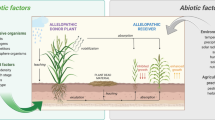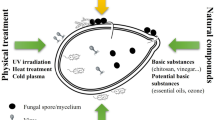Abstract
Western ragweed (Ambrosia psilostachya DC.) top growth and rhizome extracts were inhibitory to germination and growth of seedling shoots and roots of test plants in almost all cases. Germination of all plants tested was reduced an average of 19.5% by the ragweed extracts. Shoot and root growth of plants tested was reduced an average of 56.8% by the ragweed extracts. The combined effects of germination plus growth reductions resulted in the tested plants producing only 34.8% in the extracts compared to production in distilled water.
Similar content being viewed by others
References
Guenzi, W.D., McCalla, T.M., andNorstradt, F.A. 1967. Presence and persistence of phytotoxic substances in wheat, oat, corn, and sorghum residues.Agron. J. 59:163–165.
Rice, E.L. 1974. Allelopathy. Academic Press, New York.
Scholte, K., andKupers, L.J.P. 1978. The causes of lack of self-tolerance of winter rye, grown on light sandy soil. 2. Influences of phytotoxins and soil microflora.Neth. J. Agric. Sci. 26:250–266.
Author information
Authors and Affiliations
Rights and permissions
About this article
Cite this article
Dalrymple, R.L., Rogers, J.L. Allelopathic effects of western ragweed on seed germination and seedling growth of selected plants. J Chem Ecol 9, 1073–1078 (1983). https://doi.org/10.1007/BF00982212
Received:
Revised:
Issue Date:
DOI: https://doi.org/10.1007/BF00982212




